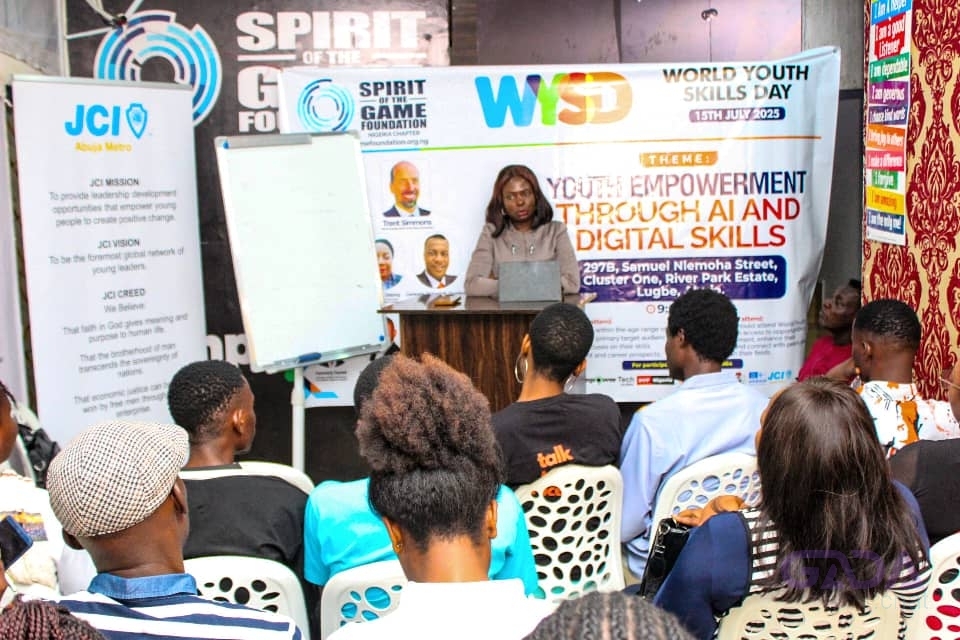NASWAMSA Engages ADVANTAGE Nigeria Limited On Strategic Waste Management Partnership
By Ishaq Abubakar Ibrahim, Lafia
***
In a significant move aimed at enhancing environmental sustainability and promoting private sector collaboration, the Nasarawa State Waste Management and Sanitation Authority (NASWAMSA), under the leadership of Hon. Mohammed Bello Isa, held a strategic meeting with ADVANTAGE Nigeria Limited at the instance of the Deputy Governor of the State, Dr. Emmanuel Akabe.
The high-level meeting took place in the Deputy Governor’s office in Lafia and was convened in response to the company’s expressed interest in partnering with the state government to revolutionize its waste management sector.
While welcoming the delegation from NASWAMSA and ADVANTAGE Nigeria Limited, Dr. Akabe commended both parties for coming together to explore innovative and sustainable waste management solutions for the state. He emphasized the importance of synergy, mutual respect, and peaceful deliberations in achieving impactful outcomes.
“This meeting signifies our administration’s openness to strategic partnerships that can drive development in key sectors such as waste management. I urge all parties to be open-minded and prioritize the collective interest of Nasarawa State,” the Deputy Governor stated.
Speaking during the meeting, the Director General of NASWAMSA, Hon. Mohammed Bello Isa, provided a comprehensive overview of waste management progress in the state. He highlighted the institutional reforms, growing community awareness, and recent cleanup initiatives, while expressing the government’s readiness to collaborate with competent technical partners to further improve waste collection, recycling, and disposal systems.
“The State Government is committed to adopting modern technologies and best practices in environmental sanitation. We welcome partners like ADVANTAGE Nigeria Limited who are willing to bring expertise, innovation, and investment into the sector,” the DG noted.
In her detailed presentation, the lead consultant of ADVANTAGE Nigeria Limited, Dr. Primrose Kouame, outlined the company’s operational model, strategic areas of intervention, and the value they intend to bring to Nasarawa State’s waste management ecosystem. She assured the state of the company’s commitment to excellence, local engagement, and environmental compliance.
The meeting concluded on a positive note with both parties agreeing to explore areas of alignment and establish a roadmap for pilot initiatives that could lead to long-term collaboration.
This engagement further demonstrates the resolve of the Nasarawa State Government to transform the waste management landscape through partnerships, innovation, and sustainable practices that safeguard public health and the environment.
By Ishaq Abubakar Ibrahim, Lafia
***
In a significant move aimed at enhancing environmental sustainability and promoting private sector collaboration, the Nasarawa State Waste Management and Sanitation Authority (NASWAMSA), under the leadership of Hon. Mohammed Bello Isa, held a strategic meeting with ADVANTAGE Nigeria Limited at the instance of the Deputy Governor of the State, Dr. Emmanuel Akabe.
The high-level meeting took place in the Deputy Governor’s office in Lafia and was convened in response to the company’s expressed interest in partnering with the state government to revolutionize its waste management sector.
While welcoming the delegation from NASWAMSA and ADVANTAGE Nigeria Limited, Dr. Akabe commended both parties for coming together to explore innovative and sustainable waste management solutions for the state. He emphasized the importance of synergy, mutual respect, and peaceful deliberations in achieving impactful outcomes.
“This meeting signifies our administration’s openness to strategic partnerships that can drive development in key sectors such as waste management. I urge all parties to be open-minded and prioritize the collective interest of Nasarawa State,” the Deputy Governor stated.
Speaking during the meeting, the Director General of NASWAMSA, Hon. Mohammed Bello Isa, provided a comprehensive overview of waste management progress in the state. He highlighted the institutional reforms, growing community awareness, and recent cleanup initiatives, while expressing the government’s readiness to collaborate with competent technical partners to further improve waste collection, recycling, and disposal systems.
“The State Government is committed to adopting modern technologies and best practices in environmental sanitation. We welcome partners like ADVANTAGE Nigeria Limited who are willing to bring expertise, innovation, and investment into the sector,” the DG noted.
In her detailed presentation, the lead consultant of ADVANTAGE Nigeria Limited, Dr. Primrose Kouame, outlined the company’s operational model, strategic areas of intervention, and the value they intend to bring to Nasarawa State’s waste management ecosystem. She assured the state of the company’s commitment to excellence, local engagement, and environmental compliance.
The meeting concluded on a positive note with both parties agreeing to explore areas of alignment and establish a roadmap for pilot initiatives that could lead to long-term collaboration.
This engagement further demonstrates the resolve of the Nasarawa State Government to transform the waste management landscape through partnerships, innovation, and sustainable practices that safeguard public health and the environment.
NASWAMSA Engages ADVANTAGE Nigeria Limited On Strategic Waste Management Partnership
By Ishaq Abubakar Ibrahim, Lafia
***
In a significant move aimed at enhancing environmental sustainability and promoting private sector collaboration, the Nasarawa State Waste Management and Sanitation Authority (NASWAMSA), under the leadership of Hon. Mohammed Bello Isa, held a strategic meeting with ADVANTAGE Nigeria Limited at the instance of the Deputy Governor of the State, Dr. Emmanuel Akabe.
The high-level meeting took place in the Deputy Governor’s office in Lafia and was convened in response to the company’s expressed interest in partnering with the state government to revolutionize its waste management sector.
While welcoming the delegation from NASWAMSA and ADVANTAGE Nigeria Limited, Dr. Akabe commended both parties for coming together to explore innovative and sustainable waste management solutions for the state. He emphasized the importance of synergy, mutual respect, and peaceful deliberations in achieving impactful outcomes.
“This meeting signifies our administration’s openness to strategic partnerships that can drive development in key sectors such as waste management. I urge all parties to be open-minded and prioritize the collective interest of Nasarawa State,” the Deputy Governor stated.
Speaking during the meeting, the Director General of NASWAMSA, Hon. Mohammed Bello Isa, provided a comprehensive overview of waste management progress in the state. He highlighted the institutional reforms, growing community awareness, and recent cleanup initiatives, while expressing the government’s readiness to collaborate with competent technical partners to further improve waste collection, recycling, and disposal systems.
“The State Government is committed to adopting modern technologies and best practices in environmental sanitation. We welcome partners like ADVANTAGE Nigeria Limited who are willing to bring expertise, innovation, and investment into the sector,” the DG noted.
In her detailed presentation, the lead consultant of ADVANTAGE Nigeria Limited, Dr. Primrose Kouame, outlined the company’s operational model, strategic areas of intervention, and the value they intend to bring to Nasarawa State’s waste management ecosystem. She assured the state of the company’s commitment to excellence, local engagement, and environmental compliance.
The meeting concluded on a positive note with both parties agreeing to explore areas of alignment and establish a roadmap for pilot initiatives that could lead to long-term collaboration.
This engagement further demonstrates the resolve of the Nasarawa State Government to transform the waste management landscape through partnerships, innovation, and sustainable practices that safeguard public health and the environment.
0 Reacties
0 aandelen
136 Views
0 voorbeeld





